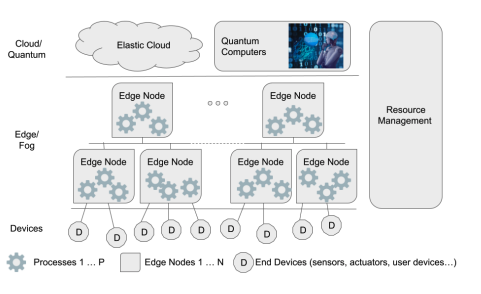Researchers Carlo Mastroianni, Francesco Plastina, Jacopo Settino, and Andrea Vinci have explored the use of quantum variational algorithms in CloudEdge architectures. The study compared the performances of the Quantum Approximate Optimization Algorithm (QAOA) and Variational Quantum Eigensolver (VQE) in managing multiple layers of heterogeneous computing nodes. The results showed that VQE outperformed QAOA due to its ability to reduce the search space and provide shortcuts towards the optimal solution. The researchers concluded that while quantum hardware currently takes longer than classical algorithms, it increases at a slower rate, suggesting future quantum computers could offer advantages in resource assignment in CloudEdge architectures.
Quantum Variational Algorithms for Resource Allocation in CloudEdge Architecture
The research paper by Carlo Mastroianni, Francesco Plastina, Jacopo Settino, and Andrea Vinci explores the use of quantum variational algorithms in CloudEdge architectures. These architectures need to manage multiple layers of heterogeneous computing nodes, including sensors, actuators, EdgeFog nodes, centralized data centers, and quantum devices. The optimal assignment and scheduling of computation on these nodes is a complex problem with NPhard complexity. The researchers explore the use of variational quantum algorithms as a potential solution to this problem.
Quantum Approximate Optimization Algorithm (QAOA) and Variational Quantum Eigensolver (VQE)
The researchers compare the performances of two algorithms, namely Quantum Approximate Optimization Algorithm (QAOA) and Variational Quantum Eigensolver (VQE). The simulation experiments performed for a set of simple problems show that the VQE algorithm ensures better performances when it is equipped with appropriate circuit ansatzes that are able to restrict the search space.
Quantum Computing in Resource Assignment
The researchers discuss how a typical resource management problem can be reformulated to be solved by QAOA and VQE. They address the problem of assigning a number of processes to a set of Edge nodes or to the Cloud. An efficient assignment must achieve a compromise between the advantages offered by Edge nodes and the larger computing and memory capabilities ensured by Cloud facilities.
Performance Comparison of QAOA and VQE
The main intent of the paper is to assess the ability of QAOA and VQE to solve the resource assignment problems and compare their performances. The results show that VQE overperforms QAOA thanks to the definition of adhoc circuit ansatzes driven by the specific problem which are able to reduce the portion of the search space and provide shortcuts towards the optimal solution with respect to QAOA.
Future of Quantum Computing in Resource Assignment
The researchers conclude that while computing times achieved with quantum hardware are currently longer than classical algorithms, they increase at a much slower rate with respect to the problem size. This supports the expectations that in the future, bigger and more efficient quantum computers will be able to provide a real advantage in resource assignment in CloudEdge architectures.
The article titled “Quantum Variational Algorithms for the Allocation of Resources in a Cloud/Edge Architecture” was published on January 25, 2024. The authors of this article are Carlo Mastroianni, Francesco Plastina, Jacopo Settino, and Andrea Vinci. The article was sourced from arXiv, a repository managed by Cornell University. The article can be accessed through the DOI reference https://doi.org/10.48550/arxiv.2401.14339.

